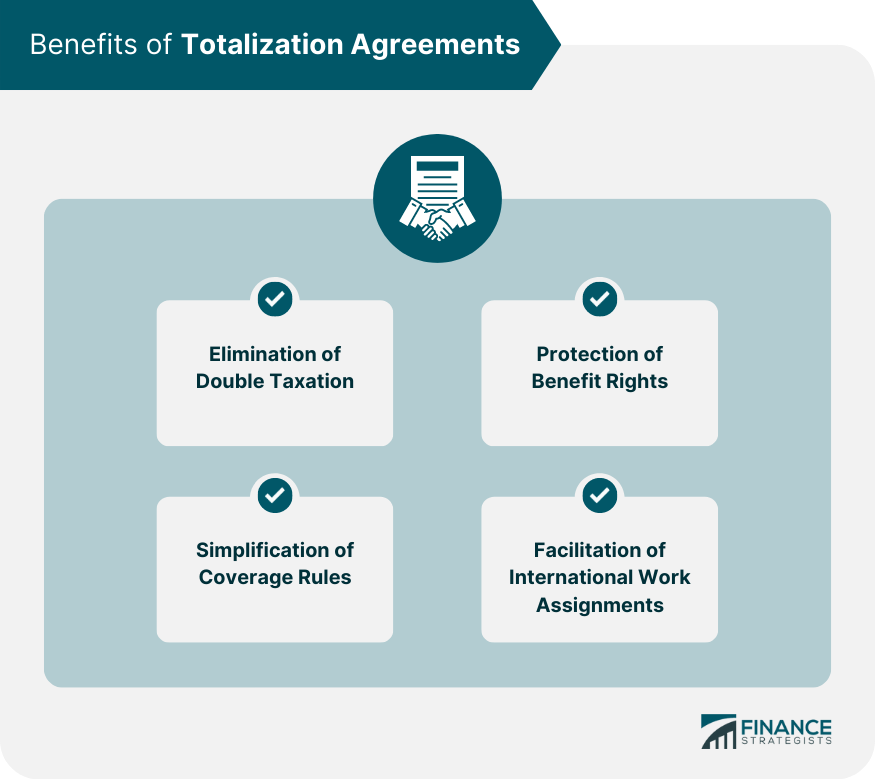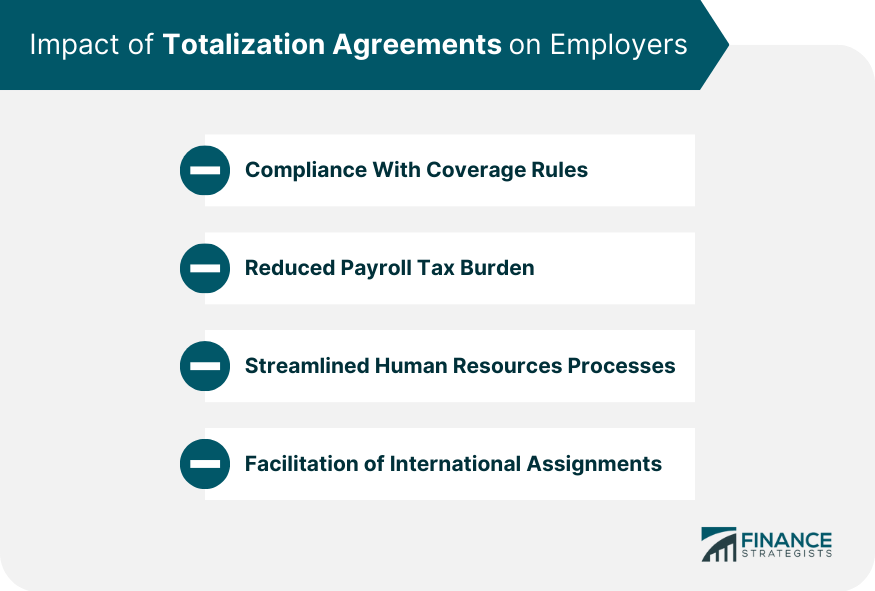Totalization agreements are international agreements between two countries that coordinate their social security systems. These agreements help to ensure that workers who divide their careers between two countries are not disadvantaged in terms of social security coverage and benefits. The primary purpose of totalization agreements is to eliminate double taxation on social security contributions and to protect the benefit rights of workers who have spent part of their careers in different countries. Many countries around the world have established totalization agreements with one another, including the United States, Canada, the United Kingdom, Australia, Japan, and numerous European countries. One of the main benefits of totalization agreements is the elimination of double taxation on social security contributions. This ensures that workers and employers are not required to pay social security taxes to both countries simultaneously. Totalization agreements help protect the benefit rights of workers who have divided their careers between two countries. This ensures that workers can receive social security benefits from both countries based on their combined work history. Totalization agreements simplify the coverage rules for workers and employers, making it easier to understand which country's social security system applies to a specific individual. By eliminating double taxation and protecting benefit rights, totalization agreements make it more attractive for employees to accept international work assignments and for employers to send workers on such assignments. Totalization agreements typically include provisions that determine which country's social security coverage laws apply to a worker, based on factors such as the length of the assignment and the worker's nationality. Many totalization agreements also include provisions for self-employed individuals, ensuring that they are covered by the social security system of one country and not subject to double taxation. Totalization agreements may include specific exceptions and provisions for special circumstances, such as workers who are employed by their government or who are temporarily assigned to a third country. Totalization agreements generally include provisions for combining periods of coverage under both countries' social security systems, which can help workers meet eligibility requirements for benefits. To claim benefits under a totalization agreement, workers typically need to provide documentation of their work history in both countries and complete any required application forms. The social security agencies of both countries involved in a totalization agreement coordinate with each other to process claims, verify eligibility, and calculate benefit amounts. Benefits under totalization agreements are usually calculated based on a worker's combined periods of coverage and earnings under both countries' social security systems. Payments for benefits under totalization agreements are typically made in the currency of the country paying the benefit, and may be subject to currency exchange rate fluctuations. Totalization agreements help employers ensure compliance with social security coverage rules for their internationally mobile workforce. By eliminating double taxation, totalization agreements can help reduce the payroll tax burden for employers and their employees working in different countries. Totalization agreements can streamline human resources processes for employers, simplifying the management of international assignments and the administration of social security benefits for their employees. Totalization agreements make it more attractive for employers to send workers on international assignments by reducing the tax burden and ensuring that their employees' benefit rights are protected. The totalization agreement between the United States and the United Kingdom helps coordinate the social security systems of both countries. It ensures that workers and their employers are not subject to double taxation and that workers can receive benefits based on their combined work history in both countries. The totalization agreement between Canada and Japan protects the benefit rights of workers who have divided their careers between the two countries. It simplifies the coverage rules for social security contributions, making it easier for employees and employers to navigate the tax implications of international assignments. The Germany - Australia totalization agreement ensures that workers who have spent part of their careers in both countries are not disadvantaged in terms of social security coverage and benefits. It also simplifies the coverage rules for workers and employers, eliminating double taxation and facilitating international work assignments. The totalization agreement between France and Brazil coordinates the social security systems of both countries, protecting the benefit rights of workers who have divided their careers between France and Brazil, and eliminating double taxation on social security contributions. As globalization continues to increase, it is likely that more countries will enter into totalization agreements to protect the rights of their internationally mobile workforce and facilitate cross-border employment. As the nature of work and the global workforce continue to evolve, totalization agreements may need to be adapted to address new challenges, such as the rise of remote work and the gig economy. Advancements in technology may lead to more efficient and streamlined social security systems, which could, in turn, affect the implementation and administration of totalization agreements. As social security systems and tax laws change over time, maintaining and updating totalization agreements can be challenging. Ensuring that these agreements remain effective and up-to-date requires ongoing cooperation and coordination between the countries involved. Totalization agreements play a crucial role in protecting the benefit rights of workers who divide their careers between two countries and in eliminating double taxation on social security contributions. These agreements benefit individuals, employers, and countries by simplifying coverage rules and facilitating international work assignments. As globalization continues to shape the global workforce, totalization agreements are likely to become even more important. Ongoing cooperation and coordination between countries will be essential to ensuring that these agreements remain effective and up-to-date, helping to promote the fair treatment of internationally mobile workers and support economic growth.What Are Totalization Agreements?
Benefits of Totalization Agreements
Elimination of Double Taxation
Protection of Benefit Rights
Simplification of Coverage Rules
Facilitation of International Work Assignments

Understanding the Key Provisions of Totalization Agreements
Determination of Applicable Coverage Laws
Provisions for Self-Employed Individuals
Exceptions and Special Circumstances
Totalization of Benefits and Eligibility
Process for Claiming Benefits Under Totalization Agreements
Documentation and Application Procedures
Coordination Between Social Security Agencies
Calculation of Benefits
Payment and Currency Considerations
Impact of Totalization Agreements on Employers
Compliance With Coverage Rules
Reduced Payroll Tax Burden
Streamlined Human Resources Processes
Facilitation of International Assignments

Examples of Totalization Agreements
United States - United Kingdom Totalization Agreement
Canada - Japan Totalization Agreement
Germany - Australia Totalization Agreement
France - Brazil Totalization Agreement
Future Trends and Potential Developments
Expansion of Totalization Agreements
Changes in Global Workforce Dynamics
Impact of Technology on Social Security Systems
Challenges in Maintaining and Updating Agreements
Conclusion
Totalization Agreements FAQs
Totalization Agreements are agreements between the United States and other countries that help protect the benefit rights of workers who have paid into both the Social Security systems of the United States and another country.
Under a Totalization Agreement, a worker who has paid into both the U.S. and foreign Social Security systems may be eligible to have their work credits combined to qualify for benefits. This can help ensure that they receive the full benefits they are entitled to, without the risk of double taxation.
The United States has Totalization Agreements with over 30 countries, including Canada, Mexico, the United Kingdom, Japan, and many countries in the European Union.
Totalization Agreements can provide several benefits for workers who have paid into both the U.S. and foreign Social Security systems. They can help prevent double taxation, ensure that workers receive the full benefits they are entitled to, and help protect the benefit rights of workers who have worked in multiple countries.
Totalization Agreements generally do not affect the amount of Social Security benefits you receive. However, they can help ensure that you receive the full benefits you are entitled to, by combining your work credits from both countries.
True Tamplin is a published author, public speaker, CEO of UpDigital, and founder of Finance Strategists.
True is a Certified Educator in Personal Finance (CEPF®), author of The Handy Financial Ratios Guide, a member of the Society for Advancing Business Editing and Writing, contributes to his financial education site, Finance Strategists, and has spoken to various financial communities such as the CFA Institute, as well as university students like his Alma mater, Biola University, where he received a bachelor of science in business and data analytics.
To learn more about True, visit his personal website or view his author profiles on Amazon, Nasdaq and Forbes.













